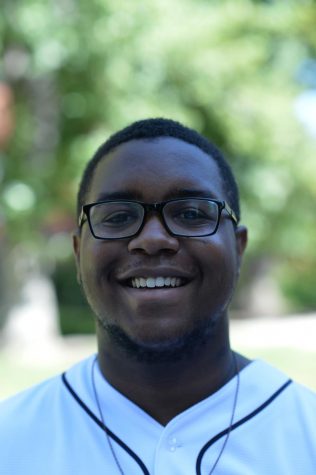Hilinski’s legacy lives on at WSU
More than three years later, Tyler Hilinski’s life is still having an impact on Pullman and its residents
RYAN PUGH | DAILY EVERGREEN FILE
Then-redshirt sophomore quarterback Tyler Hilinski looks for a receiver against Boise State on Sept. 9, 2017 in Martin Stadium. Hilinski led WSU to a 47-44 comeback win.
September 23, 2021
Jan. 16, 2018, was the tragic end of a legendary quarterback’s life, but the beginning of a new chapter of his incredible legacy at WSU.
From that day, the awareness for chronic traumatic encephalopathy, also known as CTE, within college football went to a whole new level. With foundations supporting the fight for advocacy for student-athletes in mental health, it is a new time in college football, a new age for mental health and a new day for student-athletes.
This is a story about a small-town student-athlete, who left his home of Claremont, California, came up to the Palouse and had the brain of a 65-year-old while only being 21.
This is a story about No. 3 at WSU.

From left: Mark, Ryan and Kym Hilinski hold up three fingers in honor of Tyler Hilinski as members of Hilinski’s Hope raise the flag before the first home football game of the season Sept. 8, 2018, in Martin Stadium.
This is the story of Tyler Hilinski.
The evening before his untimely death, Hilinski played the popular video game Fortnite for 6 hours. He even texted his wide receivers the morning of his death about working out at the facility at 3 p.m., according to a Seattle Times article.
Former defensive lineman Nick Begg and former linebacker Peyton Pelluer, who were roommates with Hilinski, went searching for him after Hilinski missed a team workout earlier that day.
The two student-athletes kicked the door in and found him. Hilinski was found dead in his apartment with a gunshot wound to his head and a suicide note next to him, according to the Seattle Times.
In the autopsy of his brain, Hilinski’s brain tested positive for stage one CTE, which was a shock to the whole Hilinski family.
CTE is a brain illness that is mostly caused by an excess of concussions and big hits to the crown of the head or anywhere in the head and neck area. It has been found in many NFL stars, such as Junior Seau, Vincent Jackson, Andre Waters and more who have all passed away.
A study conducted by the Boston University CTE Center back in 2019 showed that every year an athlete absorbs the excessive head collisions that come with playing football, a person’s risk for CTE increases by 30 percent. For every 2.6 years of play, the risk doubles.
Stage one of CTE is the lowest stage of the brain illness, with most patients being clinically asymptomatic to the illness, while some may complain of mild short-term memory deficits or even depressive symptoms.
Stage four of CTE is considered the most dangerous, where patients can have profound language deficits and psychotic symptoms, such as paranoia.

Candles, flowers, cougar memorabilia and a copy of The Daily Evergreen recapping the football game against Boise State University during which Tyler Hilinski lead the Cougars to an odds-defying comeback were some of the items left by mourning community members.
It came as a surprise to the Hilinski family that Hilinski’s brain was so damaged at only 21 years old. His family recalled that he had played linebacker before high school. He might have suffered a concussion as a college freshman, according to a Sports Illustrated article.
During his time at WSU, Hilinski came off the bench to lead the Cougars to a comeback win against Boise State in triple-overtime, but he could not do the same against the Arizona Wildcats.
His family noticed there were some changes to Hilinski after the game against Arizona, according to the Seattle Times.
After the tragic incident, the Hilinski’s founded a nonprofit organization called Hilinski’s Hope to honor Hilinski’s legacy and help raise awareness for mental health in student-athletes.
People can donate to Hilinski’s Hope by texting “H3HOPE” to 44321, which will allow the organization to fund programs that will help educate, advocate and destigmatize mental illness.
WSU is a member of CFB Mental Health Week, which will take place the week of Oct. 2-9. CFB Mental Health Week is a call to action for colleges and universities nationwide to participate in breaking down stigma, offering quality resources and letting student-athletes know that Hilinski’s Hope cares, according to the organization’s website.
Hilinski’s younger brother, Ryan Hilinski, was still in high school at the time of his older brother’s passing but eventually went on to be the starting quarterback for the South Carolina Gamecocks in his freshman season in 2019 and sophomore season in 2020. Ryan then transferred to play for Northwestern earlier this year.
WSU has now added a full-time clinical psychologist to the athletic department’s health and wellness staff since the tragedy.

A WSU player holds up three fingers in honor of Tyler Hilinski, a former WSU quarterback who died by suicide in January 2018.
The Cougars also have a second formal mental health screening for all members of the football team and meetings with all athletes to help identify individuals who might be at risk for issues regarding mental health, according to the Seattle Times.
As for Hilinski, he will always be remembered by this university as someone who wore his heart on his sleeve and always had a smile on his face, while his teammates loved him unconditionally.
Hilinski will forever have a lasting legacy with everyone at WSU, even for people who never got to see him play a game live in Pullman.
Tyler Hilinski is a name the Palouse will never forget.
Rest in peace, Tyler.










